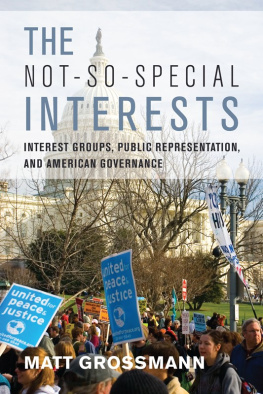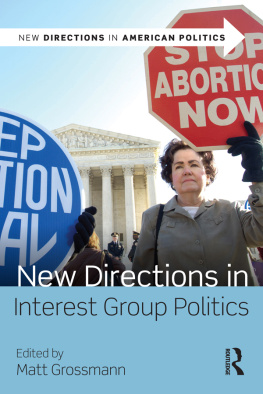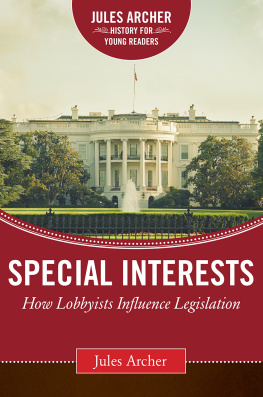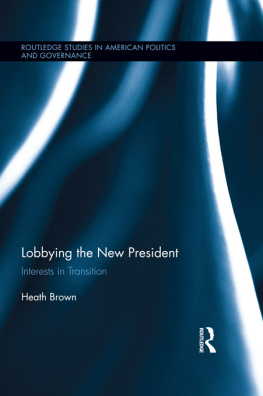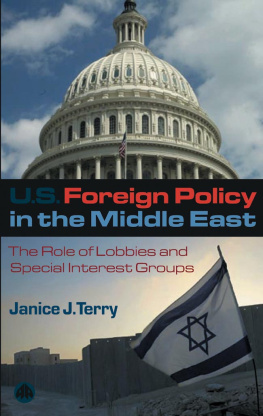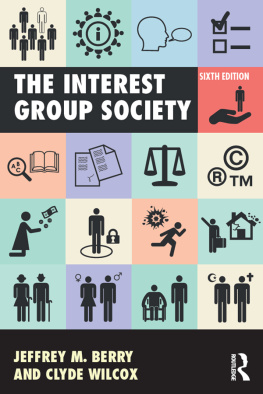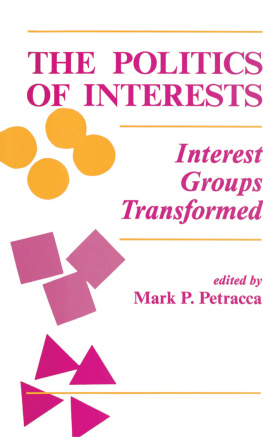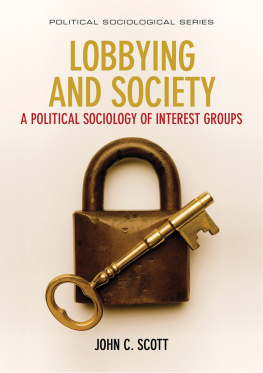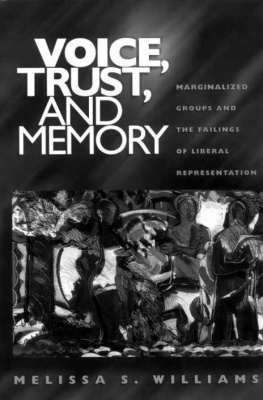THE NOT-SO-SPECIAL INTERESTS
Interest Groups, Public Representation, and American Governance
Matt Grossmann
Stanford University Press
Stanford, California
Stanford University Press
Stanford, California
2012 by the Board of Trustees of the Leland Stanford Junior University.
All rights reserved.
No part of this book may be reproduced or transmitted in any form or by any means, electronic or mechanical, including photocopying and recording, or in any information storage or retrieval system without the prior written permission of Stanford University Press.
Printed in the United States of America on acid-free, archival-quality paper
Library of Congress Cataloging-in-Publication Data
Grossmann, Matthew, author.
The not-so-special interests : interest groups, public representation, and American governance / Matt Grossmann. pages cm
Includes bibliographical references and index.
ISBN 978-0-8047-8115-2 (cloth : alk. paper)ISBN 978-0-8047-8116-9 (pbk. : alk. paper)ISBN 978-0-8047-8134-3 (ebook)
1. Pressure groupsUnited States. 2. LobbyingUnited States. 3. Representative government and representationUnited States. 4. United StatesPolitics and government. I. Title.
JK1118.G76 2012
324'.40973dc23
2011044277
Typeset by Thompson Type in 10/14 Minion
In memory of Nelson W. Polsby
Contents
Acknowledgments
I could not have completed this book without the helpful contributions of my family, friends, and colleagues. The book is dedicated to my mentor, the late Nelson W. Polsby. Nelson offered witty counsel and big-picture analysis and created a scholarly community that I relied on. At Berkeley, I also benefited from great ideas and challenging feedback from Laura Stoker, Chris Ansell, Todd LaPorte, and Neil Fligstein. The project was advanced through conversations with Margaret Weir, Paul Pierson, Henry Brady, Jack Citrin, Rui De Figueiredo, Taeku Lee, Merrill Shanks, Steve Vogel, Nick Ziegler, Christine Trost, Mike Hout, Eric Shickler, Terri Bimes, Deirdre Mulligan, Bruce Cain, Pradeep Chhibber, David Karol, Dave Hopkins, Brendan Doherty, Jill Greenlee, Rachel VanSickle-Ward, Rachel Sullivan, Peter Hanson, Lee Drutman, Danielle Lussier, Amy Lerman, Rebecca Hamlin, Alison Gash, Mike Murakami, and Angelo Gonzales. Jill Hammberbeck and Scott Janczyk helped collect data.
At Michigan State, I benefited from the support and criticism of Steve Kautz, Paul Abramson, Chuck Ostrom, Dan Lee, Ryan Black, Carlos Pereira, Cristina Bodea, Eric Chang, Mike Colaresi, Josh Sapotichne, Ani Sarkissian, Jeff Conroy-Krutz, Tom Hammond, Ric Hula, Cory Smidt, Bill Jacoby, Sandy Schneider, and Eric Juenke. At other institutions, I received important feedback from McGee Young, Kristin Goss, Amy McKay, Allan Cigler, Kevin Esterling, Kay Schlozman, Kristina Miller, Michael Heaney, Ken Wald, Andrew McFarland, Mary Katzenstein, Elizabeth Sanders, Suzanne Mettler, Richard Boyd, Gary King, Allan Brandt, Charles Shipan, John Aldrich, Scott Page, John Sides, Ray La Raja, Keena Lipsitz, Dorie Appollonio, and Rick Hall. During the publication process, I received assistance from Stacy Wagner, Jessica Walsh, and several anonymous reviewers.
My family has also been remarkably supportive. Thanks to my mother and father, Jan and Larry, as well as Mindy, Sandy, and Valerie, for their love and patience. Sarah Reckhow, my wife and colleague, deserves more credit than anyone else for encouraging me as I wrote this book, providing constant support and feedback for the last eight years.
Introduction
Public Factions and Organized Interests
Depending on ones perspective, Washington, DC, either is overrun by special interest groups or features the worlds most active civil society. Today, more than 1,600 organizations in Washington claim to speak on behalf of public groups or issue perspectives in national politics. and the Christian Coalition, for example, more than 150 organizations represent ethnic and religious groups in the nations capital. The advocacy community has been expanding dramatically for several decades (Berry 1989; Walker 1991).
The burgeoning of advocacy raises two fundamental questions of democratic politics that this book hopes to answer. First, what types of public groups generate extensive organized representation to speak on their behalf? In short, who is represented, and whose voice is heard?
Commentators frequently raise more sensationalized versions of these questions. For instance, the possibility that some Indian tribes bought their way to political influence through the disgraced lobbyist Jack Abramoff was a prominent concern of 2006. The alternative story, that Abramoff extorted millions of dollars without delivering the promised favors in return, seemed just as abhorrent. If American Indians can have their voice heard in Washington only by hiring a lobbying firm and making campaign contributions, democracy seems worthy of indictment. In addition to worrying that some public groups and organizations lack a route to influence, Americans fear that powerful constituencies and organizations can wield a veto over government action. John Mearsheimer and Steven Walt (2007), for example, feign incredulity over the disproportionate influence of Washington organizations that seek to align American and Israeli foreign policy. Because these organizations seek to represent Jews in policy discussions, the authors were met with charges of anti-Semitism. The suspicion that some groups use interest groups to gain advantage over others stimulates robust and often vitriolic commentary, but these public debates also reflect the two important concerns that this book raises: How do some constituencies become better represented by interest groups than others, and why are some organizations much more successful in advocating on behalf of these groups?
Detached investigations of the implications of Washingtons system of organized advocacy are not common. Both public intellectuals and political elites find it preferable to cry out against the unearned clout of the underspecified groups that they oppose. In each of the last ten sessions of Congress, for example, members have denounced the influence of the special interests in floor speeches at least fifty times. Opposition to these villains seems just as profitable for political candidates. In each of the last six presidential elections, candidates have vowed to oppose the special interests during nationally televised debates. Bills reforming lobbying, ethics, and campaign finance designed to cure undue interest-group influence are introduced in every session of Congress; reforms were passed in 1995, 2002, and 2006. On taking office, President Obama also implemented new restrictions on lobbyist participation in his administration. Each time, policymakers explain that they are finally putting an end to the poor practices of their predecessors, reducing the influence of interest groups. Meanwhile, the Washington interest-group community continues to expand, along with the amount of money spent to influence national policy.
Campaigning against interest groups and their lobbyists in Washington remains a winning political strategy, especially compared to parsing which interests are and should be well represented. During the campaign for the 2008 presidential primaries, for example, Hillary Clinton earned derision by suggesting that some lobbyists represent real Americans, including nurses and social workers. Throughout the primary process, both John Edwards and Barack Obama distinguished themselves from Clinton by stressing that they did not take money from special-interest political action committees (PACs) or lobbyists.

